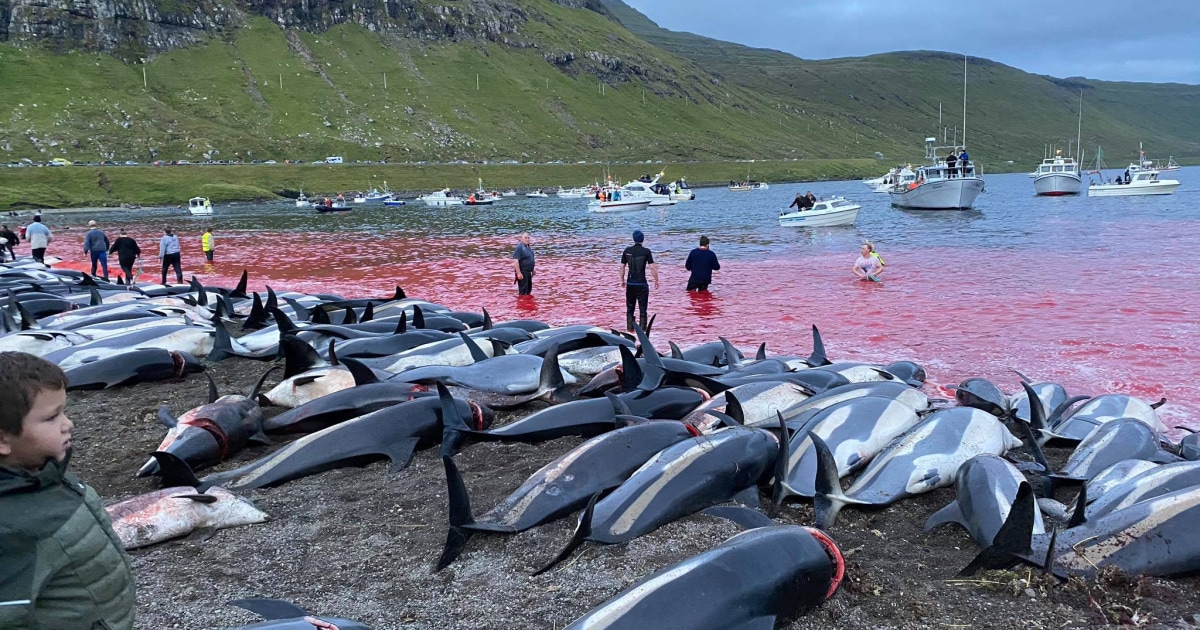
Dolphin hunting is a centuries-old practice in the Faeroe Islands.
But the tradition is facing fresh scrutiny after more than 1,400 of the aquatic mammals were killed Sunday in a record-breaking slaughter that has sparked outcry among local residents and global environmental groups.
The hunt in the North Atlantic islands is not done for commercial purposes and is authorized by the government, but even those who support the practice expressed concern this year's event could prompt greater scrutiny.
For hundreds of years, residents of the Faeroe Islands have participated in the annual hunting tradition, which is known as the "grind," or grindadráp in Faeroese. It sees pilot whales, the second largest species of dolphins following the orcas, and other dolphins corralled into fjords before being stabbed to death.
The remote island's tradition was brought to global audiences in the Netflix documentary "Seaspiracy" earlier this year.
According to the Faeroese government, the practice is "fully regulated" and considered "sustainable," with around 600 pilot whales and 250 white-sided dolphins caught on average each year over the past two decades.
Sunday's catch blew past that average, however, with the Seattle-based Sea Shepherd Conservation Society estimating that at least 1,428 white-sided dolphins were killed in what the organization branded a "cruel and unnecessary hunt."
"Considering the times we are in, with a global pandemic and the world coming to a halt, it's absolutely appalling to see an attack on nature of this scale in the Faroe Islands," Alex Cornelissen, Sea Shepherd Global CEO, said in a statement.
"If we have learned anything from this pandemic is that we have to live in harmony with nature instead of wiping it out."
The animal rights organization People for the Ethical Treatment of Animals, or PETA, has long called for an end to the "bloody whale slaughter" on the Faeroe Islands.
Download the NBC News app for breaking news and politics
Bjarni Mikkelsen, a marine biologist from the Faeroe Islands, said the catch represented the largest number of dolphins to be killed in a single day in the islands. Prior to that, he said the highest number had been 1,200 in 1940.
Traditionally, he said, the grindadráp is "very well-organized and when the drive happens, there are enough people on the beach that it's very seldom that a harvest lasts longer than 10 minutes."
On Sunday, he said, the slaughter lasted for just under an hour, leading to disturbing scenes on the shore that left local residents shaken.
He said he believed hunters were not prepared for the significantly large school of white-sided dolphins they encountered, with Faeroese hunts typically focused on pilot whales, which are larger and thus provide more meat.
Páll Nolsøe, a spokesperson for the Faeroe Islands' Ministry of Foreign Affairs and Culture, acknowledged that Sunday's catch was "exceptionally large." And, he said Wednesday, "there is no doubt that the whale hunts are a dramatic sight to people unfamiliar to the hunts."
However, he maintained that even Sunday's catch would be considered sustainable by the Faeroese government, with the hunting practice helping to sustain communities through locally sourced means.
"It's very important to understand that the basis of whaling in the Faeroe Islands is to provide food," he said. "The meat is distributed among the participants ... and also to local communities."
Further, he noted that the whale drives have taken place in the Faeroe Islands "since the Viking age," so the "grind" is considered by many to be an important part of the Faeroese cultural identity and heritage.
Mikkelsen said that "all of the meat" from Sunday's drive was distributed to local communities in the Faeroe Islands. "That's a positive thing at least," he said.
However, he said he believes the weekend incident at the very least highlights the need for regulations around how many dolphins can be killed each year, as well as within a single drive.
Nolsøe said that while those who participate in the grind are required to obtain permission from local authorities and are subject to animal welfare regulations requiring animals to be killed "as quickly and efficiently as possible," there are currently no rules in place around how many dolphins can be slaughtered.
As the fallout from Sunday's hunt continues, he said, that could soon be up for discussion.
World - Latest - Google News
September 15, 2021 at 09:10PM
https://ift.tt/2Xlkk6a
More than 1,400 dolphins killed in Faeroe Islands hunt, stirring fresh anger over old tradition - NBC News
World - Latest - Google News
https://ift.tt/2SeTG7d
https://ift.tt/35oCZy1
Bagikan Berita Ini














0 Response to "More than 1,400 dolphins killed in Faeroe Islands hunt, stirring fresh anger over old tradition - NBC News"
Post a Comment